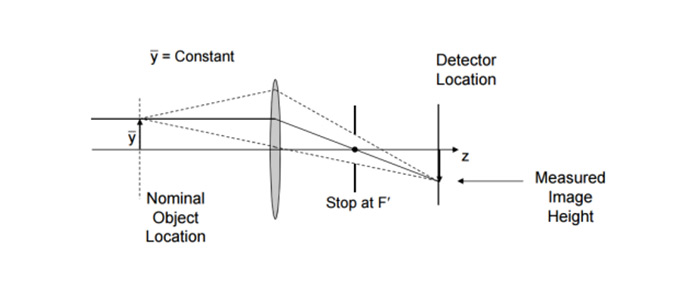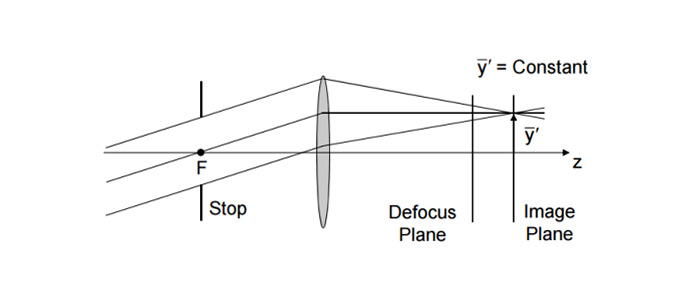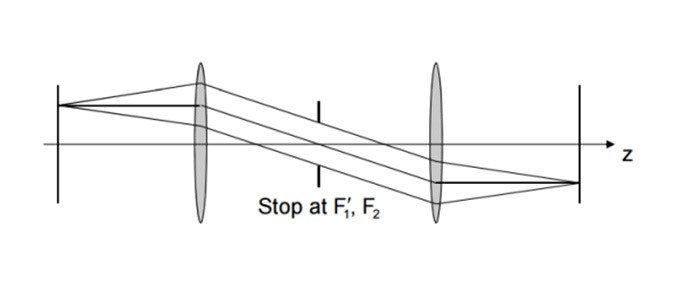Telecentric Lens is an optical design that the principal ray is in parallel to the optical axis. Because of these characteristics, the main advantages of the telecentric lens is to eliminate distortion when off-focus and provide superior image performance when doing high precision measurement and inspection.
Telecentric lens has three catagories, object space telecentric, image space telecentric and bi telecentric lens. The difference between these three kinds lies in that the chief ray which is parallel to the optical axis is on the object space, or in the image side, or in both the object and image spaces. Object space telecentric lens and bi telecentric lenses are the most popular telecentric lens in applications.
The purpose of telecentric lens design is to eliminate the difference in magnification caused by the inconsistency of the distance between the measured object and the lens. And different telecentric lenses will need different telecentric designs.
The convergent center of the object space chief ray parallel to the optical axis is located infinitely far away from the image space, which is called the object space telecentric light path. Its function is: it can eliminate the reading error caused by inaccurate focusing of the object.

The convergent center of the chief ray of the image side parallel to the optical axis is located infinitely far away from the object, which is called the image-side telecentric light path. Its function is to eliminate the measurement error caused by the inaccurate focusing on the image side.

It integrates the dual functions of object space/image space telecentricity, and is mainly used in the field of vision measurement and detection. Bi-telecentric lens, which is also called a double telecentric lens, adopts this principle.

The image resolution is generally measured by the CTF (contrast transfer function) that quantifies the existing spatial frequency contrast of the image sensor, and the unit is lp/mm. Most machine vision integrators often just gather a large number of cheap low-pixel, low-resolution lenses, and finally can only generate blurred images. With a telecentric lens, even with a small pixel image sensor, high-resolution images can be generated.
There was a view that the telecentric lens mainly solves the distortion problem. In fact, the telecentric lens solves not only the distortion problem, but the low distortion is only an additional attribute of the telecentric lens. The unique optical characteristics of the telecentric lens: when the object moves in the field of view, its magnification in different positions will not change, which determines that it cannot be replaced by ordinary industrial lenses in some fields. For example, its larger depth of field can be well adapted to the working environment on site, which is not a problem that can be solved only by algorithms.
Designing a telecentric industrial lens for parallel-light imaging is not complicated in theory, but it is another matter to achieve a certain resolution and imaging quality. The telecentric lens design and manufacture is indeed more difficult than a lens in the general sense. The reason is that the size of the optical lens of the telecentric lens is relatively large, which makes the correction of various phase differences of the edge light more difficult.
In order to obtain a good image quality of the edge field of view, higher product design and manufacturing accuracy is required, and in many cases it is necessary for the designer to have relatively rich design experience.

Photos Taken by Conventional Lens (left) and Telecentric Lens (right)
How to choose the right telecentric lens design? First of all, the lens-compatible CCD size should be equal to or larger than the camera sensor size; Secondly, calculate the mag when the object size and camera sensor size are confirmed, always choose a smaller mag if no existing suitable mag so as to cover all the object area. Finally, check the WD & lens size to make sure it can fit in the whole system's design. Pay attention to other requirements like distortion, or DOF if necessary.
References:
1. "Tutorial of Telecentric Lens", Haosheng Hu, James C. Wyant College of Optical Sciences Website,
https://wp.optics.arizona.edu/optomech/wp-content/uploads/sites/53/2016/10/Tutorial_Hu_Haosheng.pdf
Related Machine Vision Telecentric Lens Products
Related Machine Vision Telecentric Lens Articles
 English
English  日本語
日本語  한국어
한국어  français
français  Deutsch
Deutsch  Español
Español  italiano
italiano  русский
русский  português
português  العربية
العربية  ไทย
ไทย 